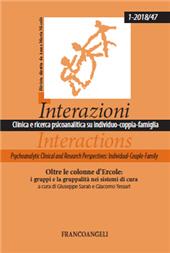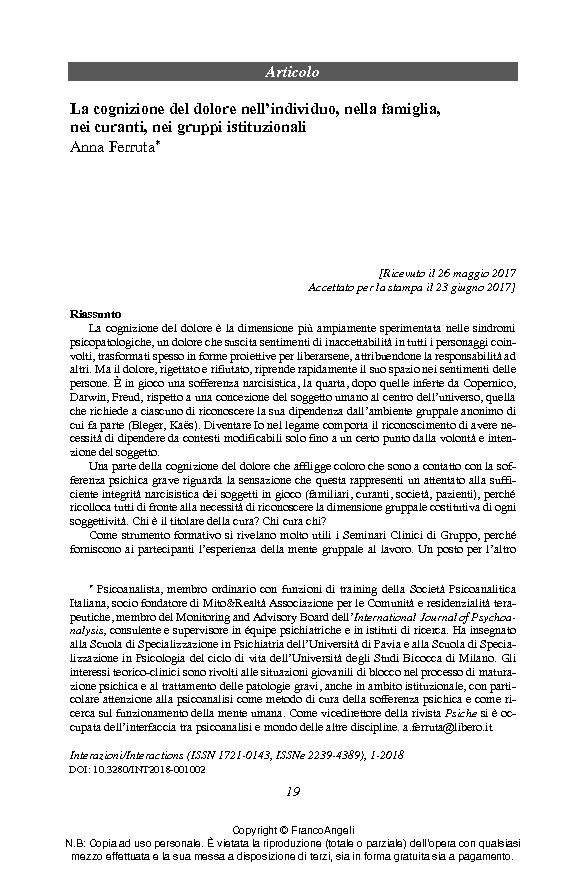La cognizione del dolore nell'individuo, nella famiglia, nei curanti, nei gruppi istituzionali
19-30 p.
La cognizione del dolore è la dimensione più ampiamente sperimentata nelle sindromi psicopatologiche, un dolore che suscita sentimenti di inaccettabilità in tutti i personaggi coinvolti, trasformati spesso in forme proiettive per liberarsene, attribuendone la responsabilità ad altri. Ma il dolore, rigettato e rifiutato, riprende rapidamente il suo spazio nei sentimenti delle persone. È in gioco una sofferenza narcisistica, la quarta, dopo quelle inferte da Copernico, Darwin, Freud, rispetto a una concezione del soggetto umano al centro dell'universo, quella che richiede a ciascuno di riconoscere la sua dipendenza dall'ambiente gruppale anonimo di cui fa parte (Bleger, Kaës). Diventare Io nel legame comporta il riconoscimento di avere necessità di dipendere da contesti modificabili solo fino a un certo punto dalla volontà e intenzione del soggetto.
Una parte della cognizione del dolore che affligge coloro che sono a contatto con la sofferenza psichica grave riguarda la sensazione che questa rappresenti un attentato alla sufficiente integrità narcisistica dei soggetti in gioco (familiari, curanti, società, pazienti), perché ricolloca tutti di fronte alla necessità di riconoscere la dimensione gruppale costitutiva di ogni soggettività. Chi è il titolare della cura? Chi cura chi? Come strumento formativo si rivelano molto utili i Seminari Clinici di Gruppo, perché forniscono ai partecipanti l'esperienza della mente gruppale al lavoro. Un posto per l'altro non rappresenta una ferita depressivogena per il narcisismo sano, ma, al contrario, un suo potenziamento: c'è sempre dell'altro, c'è sempre qualcuno da cui potere ricevere e apprendere. [Testo dell'editore].
The cognition of pain is the most widely experienced dimension in psychopathological syndromes, a pain which provokes feelings of unacceptability in all the individuals affected. These feelings are often transformed into projective forms in an attempt to be free of them, attributing the responsibility to others. But rejected and refused pain rapidly reclaims its space. It is a question here of a narcissistic wound, the fourth one after those inflicted by Copernicus, Darwin and Freud, regarding a conception of the human subject who perceives him/herself as the centre of the universe, forcing him/her to recognise their emotional dependence on the anonymous groupal environment to which they belong (Bleger, Kaës). Becoming oneself in the relationship implies acknowledgment of the need to depend on contexts which are only to a certain extent modifiable by a subject's will and intention.
Part of the cognition of the pain which afflicts those in contact with serious psychic suffering regards the sensation that this suffering represents an attack on the sufficient narcissistic integrity of the subjects involved (families, caregivers, society, patients), because they are all forced to acknowledge the groupal dimension which is a constituent part of every subjectivity. Who is the recipient of the treatment? Who is treating who? Group Clinical Seminars are seen to be very useful as training tools, because they offer participants the experience of groupal mentality at work. Recognising a place for the other in oneself does not constitute a depressogenic wound for healthy narcissism, on the contrary it potentiates it. There is always something "other", there is always someone to receive and learn from. [Publishers' text].
Fait partie de
Interazioni : clinica e ricerca psicoanalitica su individuo-coppia-famiglia : 47, 1, 2018-
Articles du même numéro (disponibles individuellement)
-
Informations
Code DOI : 10.3280/INT2018-001002
ISSN: 2239-4389
KEYWORDS
- Dolore, psicopatologia, ambiente, gruppo, formazione, narcisismo, depressione
- Pain, psychopathology, environment, group, training, narcissism, depression



